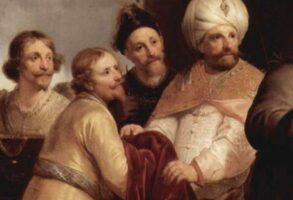
Published April 9, 2008
George Weigel's weekly column The Catholic Difference
Who were the most publicly influential American Catholics of the twentieth century?
By shaping Vatican II’s teaching on Church-and-state, Father John Courtney Murray, SJ, helped turn Catholicism into the world’s foremost institutional advocate of religious freedom. John F. Kennedy put Catholics into play at the highest level of our national politics. Fulton J. Sheen gave Catholicism an engaging public face on radio and television for years. Thomas Merton’s books have sold in the millions.
If by “publicly influential,” however, we mean a Catholic whose ideas changed the way Americans think, who reshaped our politics and our public policy, and whose influence seems likely to endure, then William F. Buckley, Jr., who died February 27, must be given his due.
The most telling thing about Bill Buckley, the man, is that so many people thought of him as a friend. Underneath those faux-High Anglican tones and that disheveled, preppie look was a genuine democrat (if his shade will pardon the term): a man who treated junior staffers and unheard-of authors with an openness and cordiality rarely found in world-famous figures. He was “Bill” the first time you met him, and “Bill” he remained.
There was a lot of little boy — and a lot of rebel — in him; both traits help account for his infectious enthusiasm, his joie de vivre, and his democratic personal instincts. Above all — or, perhaps better, beneath it all — Bill Buckley was a Catholic gentleman whose faith had taught him how to treat others, including those with whom he disagreed.
The obituaries stressed his remarkable productivity as author, editor, columnist, lecturer and television personality, to which he added the skills of an accomplished musician and sailor. He was not without ego, but he could turn his humor on himself. Running for mayor of New York, he was asked what he would do if elected; “Demand a recount,” was the immediate riposte.
His first book, God and Man at Yale, was excoriated by the American educational establishment of 1951 as the reactionary ramblings of an intellectual pup who hadn’t been house-broken; today, “GAMAY,” as Bill sometimes called it, stands as an eerily prescient preview of the intellectual and moral implosion that’s taken place in elite American higher education over the past 40 years. His best novel, Stained Glass, was a penetrating exploration of the moral dilemmas of statecraft.
He was not politically infallible, and he probably shared Barry Goldwater’s regret at having criticized, on constitutional grounds, federally mandated desegregation. No one who ever knew the man, however, could imagine him a bigot. His tolerance and civility extended far beyond the sphere of his personal relationships, however.
Analysts credit Buckley with creating the “fusion” conservatism that, via National Review, brought the social/cultural conservatives, the pro-market conservatives, and the anti-communist/national security conservatives into one politically potent tent, thus making possible the Reagan Revolution. Which is true enough. But Bill’s even greater public service was to purge the conservative movement of the anti-Semitism, racism, xenophobia and isolationism that had infested the fever swamps of the American Right in the FDR period and beyond. There was no room for bigotry in Bill Buckley’s big tent.
In 1949, Lionel Trilling, the Columbia literary critic who embodied the pragmatic, results-oriented liberalism of Franklin Roosevelt and Harry Truman, deplored those American conservatives who do not “express themselves in ideas but only in actions or in irritable gestures which seek to resemble ideas.” Bill Buckley changed all that, by his own intellectual efforts and sparkling personality, as well as by his nurturing the thought, the writing and the careers of countless others. If, as Barack Obama conceded in one of his more candid moments, the conservative world has for years been the center of ideas in American politics, a lot of the credit for creating a true intellectual marketplace in our public life must go to Bill Buckley.
He once told his son, Christopher, that the active life was an antidote to melancholy. Now beyond the reach of melancholia, may he rest in peace.
George Weigel is Distinguished Senior Fellow of the Ethics and Public Policy Center in Washington, D.C. and holds EPPC’s William E. Simon Chair in Catholic Studies.











